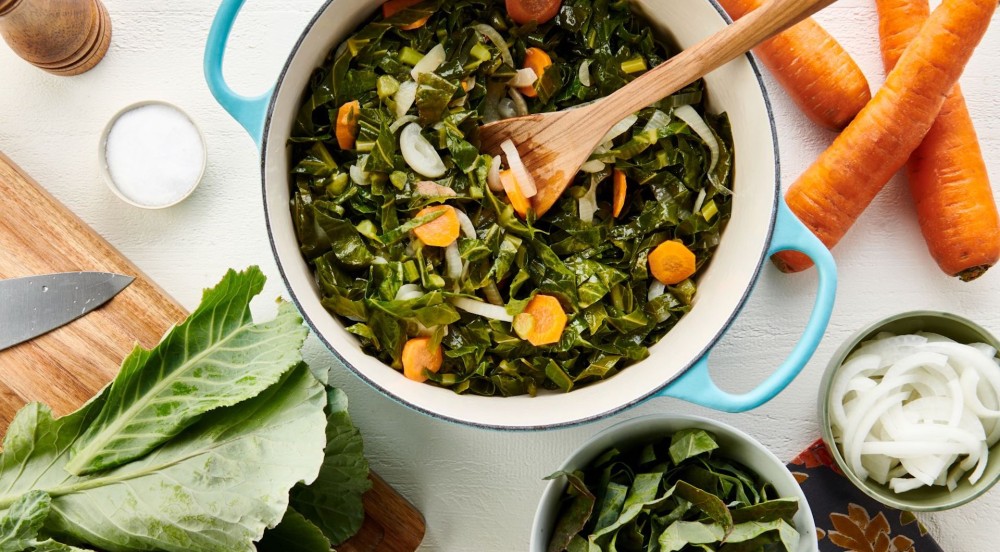Return to the origins of soul food with simple ingredients and spices that are vitamin-dense and tasty.
National Soul Food Month, celebrated during the month of June, was created to highlight the in-demand cuisine steeped in tradition, filled with mouthwatering flavors, and has an emotional connection to family. Originating from African food, Soul Food emerged when Black people were enslaved and received limited food options including cornmeal, rice, and sweet potato. Not only did they make do with these ingredients, they combined it with scraps from the farm and turned it into a delicious new cooking style unique to them. Despite its humble beginnings, soul food has emerged as an in-demand American cuisine to this day, as a source of pride, with hearty staples like fried chicken, creamy mac n cheese, collard greens, and cornbread, enjoyed for special occasions, family gatherings, and holidays.
These days, a number of restauranteurs have put their own spin on the classic dishes with modern cooking styles and ingredients, venturing away from fried and fat-laden recipes. Adenah Bayoh and Elzadie “Zadie” Smith, the founders of Cornbread Farm to Soul restaurants, recently opened their third location in Brooklyn. The co-owners are dedicated to celebrating the cuisine by returning to the farm-fresh ingredients their ancestors once used to bring their dishes to life. Bayoh immigrated to the United States at age 13 from Liberia, West Africa and Smith, a native of Tifton, GA, comes from a culinary background and rich Southern heritage. Cornbread’s menu is inspired by the culinary traditions of the generations of men and women Smith learned from in the Deep South, including her own grandmother, who was a farmer and restaurant owner.

As a Black and women-owned modern soul food restaurant, they are on a mission to create food that improves their community. Their menu only includes made-from-scratch family recipes that also provide nutritional value by sourcing seasonal ingredients and hormone and steroid-free chicken, proving that savory and authentic food can be healthy and responsibly sourced.
Among their specialties, collard greens are a customer favorite. Speaking on the importance of the dish, Bayoh explains, “The dish is a staple in African American cuisine as one of the few plants enslaved people were allowed to cultivate. On Sundays, families would gather, and mothers would cut the greens into beautiful uniform strips. They would talk, laugh, and share stories while the greens would cook for hours.” It also represents the African influence in our food, specifically “Its representation in the Pan African flag…adorned with red, black, and green stripes; the flag serves as a symbol–not only of the struggles African Americans have had to overcome but also a reminder of the beauty and community born out of it, exemplified in dishes like collard greens.”
In addition to the historical significance of the dish, it is incredibly nutritional and flavor-packed due to its “dark leafy greens enjoyed across cuisines in the African diaspora…combined with the umami flavor of onions, carrots, and garlic makes it both a delicious and nutritious dish for all to enjoy.” the pair says. These greens are packed with fiber, calcium, folate and Vitamins K, C, and A.
Cornbread’s menu includes Soul food classics such as baked macaroni and cheese, collard greens, cabbage, chicken, whiting, catfish, peach cobbler, and, of course, its signature cornbread. Smith developed the menu and flavor profiles of each meal that is served. Today, she shares their famous collard green recipe with Ebony readers.
Collard Greens Recipe

Ingredients:
5 lbs of Collard greens (shredded and cleaned)
2 quarts of water
1/2 tsp cayenne pepper flakes
1/2 cup distilled vinegar
1 tbsp salt
1 smoked Turkey wing
1/2 cup chopped onions
4 chopped garlic cloves
1 carrot sliced in rings
1 tbsp oil
Directions:
1, heat oil in a medium sized pot over medium heat
2, add onions and garlic and cooked until fragrant
3, add Remaining ingredients and cook for 2 hours or until the leaves are very soft,
4, serve immediately
For crunchier carrots, wait until the last 30 minutes of cooking time to add.













